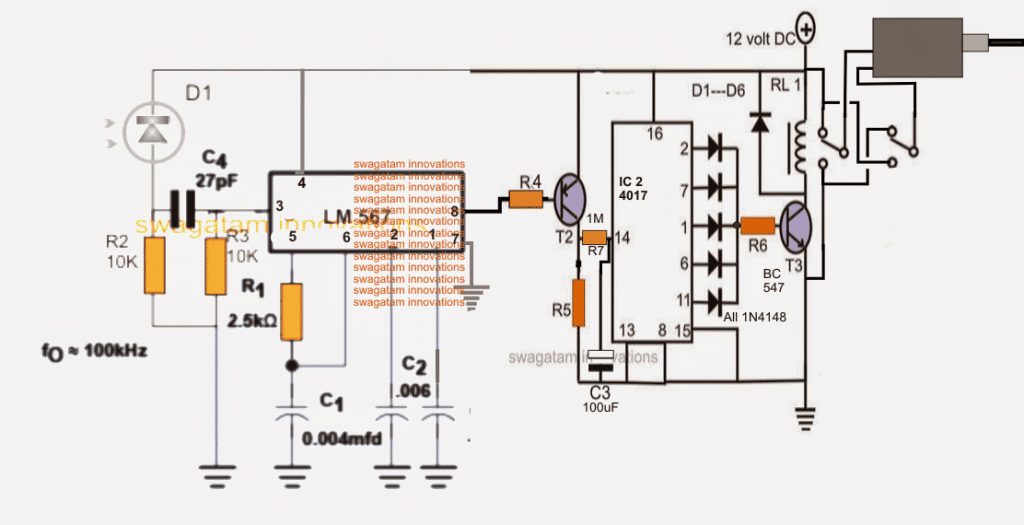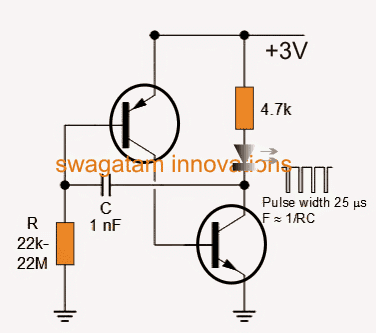In this article I will explain about a simple infrared remote controlled door lock circuit which can be used for securely locking doors through unique foolproof IR frequencies.
The proposed infrared remote controlled door lock circuit can be used for locking your main door, gate, garage door, shop or any entrance which may need a foolproof internal locking through a remote control system.

How it Works
The above diagram shows a simple IR based remote receiver design, wherein the IC LM567 forms the IR frequency decoder while the IC 4017 forms the flip flop stage.
D1 is a photodiode sensor which converts the IR frequency from the IR transmitter into a correspondingly pulsating voltage across R2.
This pulsating voltage is sensed and recognized by the pin3 of the IC LM567, if the frequency of the pulse matches with the fixed frequency of the IC it instantly activates its output pin8 with a low logic pulse.
The IC frequency is fixed by selecting R1/C1 appropriately which becomes the unique code of that particular remote control system. Any value between 10 Hz to 500 kHz may be set using these RC timing components of the IC.
When a matching frequency is detected across R2, pin8 of the LM567 is rendered with a low signal.
This triggers the connected BC557 sending a positive pulse to pin14 of the IC 4017.
Pin14 being the clock pin of the IC 4017 generates a resulting shifting high across its shown outputs, depending on the initial status either a high or a blank signal is created at the base of the attached BC547 relay driver stage.
This enables the relay to toggle over the respective position forcing the solenoid device towards a locking or an unlocking position.
C3 is purposely introduced in order to delay the response of the relay toggling, this implies that the remote transmitter will need to be pressed for a few seconds in order to implement the above locking/unlocking procedures. This ensures that an intruder or a hacker is not able to influence the Rx through a varying/sweeping frequency generating device.
The IR Transmitter Circuit
The following image illustrates the IR transmitter handset for the above RX unit, which becomes the remote control handset for locking or unlocking the door.

The above Tx is a simple RC based two transistor oscillator, which may be applied as the Tx remote handset for the proposed IR door lock circuit.
The 3V is applied through a push button switch activating the pulses through the IR diode towards the photo diode of the above explained Rx circuit.
In this Tx circuit also the R and C components must be accordingly selected such that the transmitted frequency uniquely matches with the set frequency of the Rx circuit.
The relevant formulas may be studied in the following article
After assembling the proposed infrared remote controlled door lock circuit, the units may be tested externally to confirm the relay toggling in response to the Tx IR frequency.
Once this is done, the Rx circuit may be suitably enclosed inside a sturdy box and integrated with the door from the interior for the intended locking/unlocking
Hello Swagatam, thank you for contribution to electronics here. I am always working with your circuits as my students project.
please I need a simple IR circuit for automatic open and closing of a sliding door in a business center. its my students project.
Thank you Alfred, Glad you found my circuits helpful.
You can refer to the following post where i have replied to your other comment regarding the same topic:
https://www.homemade-circuits.com/automatic-door-circuit-using-pir-touchless-door/
R these door locks hack proof?
It can be made hack proof by adding a delay capacitor 100uF at the base of T3. The actual owner will know about the delay and will wait for a few seconds to get the activation done….on the other hand a hacker may try with random frequencies and may not know at which frequency he has to wait…and therefore can never achieve the goal.
Hi there, Love the posts,
I’ve a question though, You’ve got several door security circuits, I’ve been looking for a good actual locking piece. (Electric Deadbolt)
Do you have any recommendations on ones you’ve used before for front doors?
Hi, thanks, glad you liked it! By deadbolt I guess it is a bolt mechanism which slips in and out into a slot during locking and unlocking the door. The suggested car central lock device in the above article will behave in the same way.
Sorry I wasn’t meaning directly related to this project so much, more one for a house’s front door, (I’d picked a project in this case that i thought was a good one for asking in.
I was actually looking at doing something very similar combining several things similar to other projects for a house Front Door Smart Look, (RFID, Bluetooth, CapacitiveSense Keypad)
Would be keen to hear if you’ve used a good house electric deadbolt before. I also hadn’t decided if it should be made for battery or trying to wire it in.
OK go it, presently i do not have the mentioned design with those specified features, if feasible I will try to design and post it in this website soon.
hii….. can i use the RF(433mhz) communication insted of IR communication technology
yes you can do it directly using the available modules….you won't require the above explained circuits.
Hi.. can this remote transmit over a wall or it should be pointed directly throught it like the TV remote?
I need a remote that can do this at least over a wall. Can you help me pleas?
Thank you so much for your work
Hi.. can this remote transmit over a wall or it should be pointed directly throught it like the TV remote?
I need a remote that can do this at least over a wall. Can you help me pleas?
Thank you so much for your work
No, the above is an IR remote control and IR can never pass through opaque obstacles, you will need an RF based transmitter circuit for communicating across rooms, as I have explained below:
https://www.homemade-circuits.com/2013/07/simple-100-meter-rf-module-remote.html
Pls any idea on free radiant energy circuit
Hi Swagatam, Great job with this site. I have a question- How can you create a simple and cheapest SMS switch – probably using any simple module like SIM 900 or any other, and a simple micro-controller – just to switch ON/OFF low power LEDs using SMS?
I will really appreciate help in this- just a simple way to put ON and OFF low power LEDs using SMS.
Hi Evans, thanks!
I don't have much idea regarding using a SIM900, but the same can be implemented using the following simple idea using a cellphone as a modem through missed calls:
https://www.homemade-circuits.com/2012/01/how-to-build-gsm-based-cell-phone.html
Nice idea, Swagatam.
Perhaps, you can also include a schematic without 4017 for those locks which only needs to be opened.
Thank you Abu-Hafss,
yes you are right, for a spring loaded solenoid mechanism it may be simply connected across T2 collector and ground, T2 will then need to be upgraded to a TIP127 or similar, and a diode connected connected across the solenoid coil